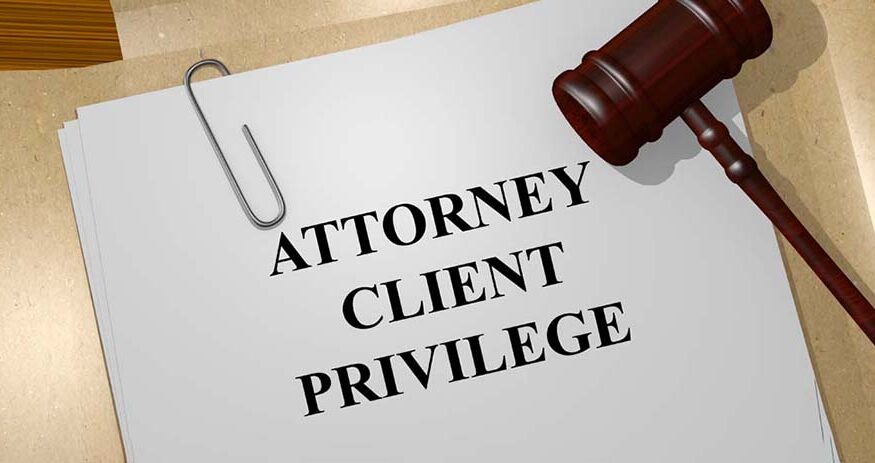Sharing complaint with reporter did not waive privilege, appeals court rules
By: Bridgetower Media Newswires//November 16, 2023//
Sharing complaint with reporter did not waive privilege, appeals court rules
By: Bridgetower Media Newswires//November 16, 2023//
By Barbara Jones
Attorneys do not waive the attorney-client or work product privilege by giving a copy of a final, signed complaint to a reporter before it is served or filed, the Court of Appeals ruled Monday, Nov. 6.
A unanimous Court of Appeals granted a writ of prohibition against an order granting discovery of the claimed privileged information in In re Daniel Cragg, et al., a defamation suit venued in Hennepin County.
The complaint that is the object of the writ proceedings is in a personal injury lawsuit in Dakota County between plaintiff Graclyn Trimble and defendant Dalvin Cook, then a player for the Minnesota Vikings. The plaintiff, represented by Daniel J. Cragg, alleged that she was physically abused by Cook, with whom she had been in a relationship. She initially demanded in a letter $13.3 million in damages.
On Nov. 9, 2021, Cragg and Trimble met with a Star Tribune reporter and shared with her a copy of the final complaint. It asserts that Cook committed assault, battery and false imprisonment. The complaint went from reporter Rochelle Olson to Cook’s counsel. Cook’s agent then told ESPN that Trimble assaulted Cook.
The next day, Cragg published a press release admonishing ESPN for one-sided reporting and “journalistic malpractice.” In response, Cook sued Cragg for defamation.
Then attempts at discovery proceeded. Cragg refused to answer deposition questions, citing the attorney-client and work product privilege. Cook moved to compel discovery, seeking disclosure of the factual basis of Trimble’s $13.3 million settlement demand; communications between Cragg and Trimble regarding media strategy or public relations; and information related to counsel’s investigation, evaluation, and knowledge of facts underlying the personal-injury action and the allegedly defamatory statements made by Cragg up to and including the time at which he communicated with the media in November 2021.
A Hennepin County judge granted Cook’s motions to compel, saying Cragg had waived the privileges.
Cragg sought a writ of prohibition that the court granted in an opinion written by Judge Jennifer Frisch. The Court of Appeals said that the district court judge abused his discretion and exceeded his authority.
Cragg, his attorney Christopher Morris, and Cook’s attorney Terrance Moore, all declined comment. Minnesota Lawyer consulted three Minneapolis ethics attorneys Charles Lundberg, William Wernz and Eric Cooperstein, who also declined comment.
The attorneys are likely friendly with Cragg, who is on the Lawyers’ Professional Responsibility Board.
Final complaint disclosed
The court first addressed the release of the complaint to the press, saying that it was not a waiver of the privilege because a complaint is not a confidential communication from a client to an attorney.
“We are unaware of any authority supporting the proposition that the pre-filing sharing of a final pleading can result in a waiver of the attorney-client privilege or work product protection. Neither Cook nor the district court cited any authority from any jurisdiction standing for the proposition that the litigation practice of sharing the final complaint before filing it in district court operates as a waiver of such protections,” wrote Frisch.
The court also rejected the argument that by asserting defenses to the defamation action, counsel put their knowledge and professional evaluation at issue, making the information discoverable.
Abuse of discretion
The Court of Appeals next said that the district court abused its discretion by ordering discovery of protected information. The court said that questions seeking the factual basis of assertions and questions asking about counsel’s communications, strategies, or impressions were barred by privilege and that Cragg appropriately limited his responses to protect the information.
The court also noted that the district court abused its discretion in finding that communications that touched on media strategy or public relations were not privileged. The district court did not determine whether media strategy advice was part of a communication that included legal advice, but made a sweeping order compelling disclosure of all communications that included media strategy, beyond its authority
The court also said that yes-or-no questions regarding the nature of counsel’s communications with Trimble or work performed by counsel were foundational and did not invade the privilege.
Professor agrees with court
Mitchell Hamline School of Law Professor Leanne Fuith said in an email to Minnesota Lawyer that the Court of Appeals got it right.
“There were two issues in this case both of which involved the attorney-client privilege and work-product doctrine,” she wrote. “The first issue was whether the lower court had erred in finding that Ms. Trimble’s attorneys had waived the attorney-client privilege and work-product doctrine when they shared the final complaint with members of the media before it was served on the other party or filed in district court.
“On this issue, the Minnesota Court of Appeals correctly decided that Ms. Trimble’s attorneys had not waived the attorney-client privilege and work-product doctrine because the final complaint is not a communication made in confidence by a client seeking legal advice from their attorneys nor does it contain the attorney’s opinions, conclusions, mental impressions, trial strategy or legal theories.
“Its purpose is to make sure that the parties involved in the case and the court understand what is at issue in the lawsuit.
“The second issue was whether the lower court had erred in ordering Ms. Trimble’s attorneys to provide additional information that was protected by the attorney-client privilege and work-product doctrine during the discovery process.
“On this issue as well, the Minnesota Court of Appeals correctly decided that the lower court had erred in requiring the attorneys for Ms. Trimble to disclose this information. Some of the information sought during discovery included details about communications involving legal advice given to Ms. Trimble by her attorney as well as her attorney’s strategies, impressions, and opinions about her legal matter. This information was protected from disclosure by the attorney-client privilege and work-product doctrine.”
Not decided
The opinion also is noteworthy for the issues it did not reach. Having found no privilege waiver, it did not discuss whether an attorney had the right to waive the privilege.
It also did not address the applicability of the judicial-proceedings privilege. Minn. R. Civil P. 12.02(e). It said that it was neither necessary nor appropriate to do so given the reasons the writ was granted. It also did not consider whether Cook had a substantial need for the information under Minn. R. Prof. Conduct 1.6 (b) (8), which was a basis for the district court opinion but not argued on appeal. An attorney may have a right under that rule to disclose client information but that does not give the court the authority to compel it, the court said.
Cook also argued that when Cragg said that his statements or allegations were not made with actual malice or were made in good faith, Cragg waived the work product privilege. The district court did not address this argument, and the Court of Appeals followed suit.
The Court of Appeals also clearly stated that it was not deciding whether the predominant purpose test applied in cases of mixed privileged legal and non-legal advice in documents should be applied in undocumented communication.
Finally, the court also said that in granting the writ, it took no position on whether the communications sought were in fact privileged, or if were waived under any other legal basis.
Legal News
- Flight attendant indicted in attempt to record girl in airplane bathroom
- Wisconsin attorney loses law license, ordered to pay $16K fine
- Former Wisconsin police officer charged with 5 bestiality felony counts
- Judge reject’s Trump’s bid for a new trial in $83.3 million E. Jean Carroll defamation case
- Dozens of deaths reveal risks of injecting sedatives into people restrained by police
- The Latest: Supreme Court arguments conclude in Trump immunity case
- Net neutrality restored as FCC votes to regulate internet providers
- Wisconsin Attorney General asks Congress to expand reproductive health services
- Attorney General Kaul releases update at three-year anniversary of clergy and faith leader abuse initiative
- State Bar leaders remain deeply divided over special purpose trust
- Former Wisconsin college chancellor fired over porn career is fighting to keep his faculty post
- Pecker says he pledged to be Trump campaign’s ‘eyes and ears’ during 2016 race
WLJ People
- Power 30 Personal Injury Attorneys – Russell Nicolet
- Power 30 Personal Injury Attorneys – Benjamin Nicolet
- Power 30 Personal Injury Attorneys – Dustin T. Woehl
- Power 30 Personal Injury Attorneys – Katherine Metzger
- Power 30 Personal Injury Attorneys – Joseph Ryan
- Power 30 Personal Injury Attorneys – James M. Ryan
- Power 30 Personal Injury Attorneys – Dana Wachs
- Power 30 Personal Injury Attorneys – Mark L. Thomsen
- Power 30 Personal Injury Attorneys – Matthew Lein
- Power 30 Personal Injury Attorneys – Jeffrey A. Pitman
- Power 30 Personal Injury Attorneys – William Pemberton
- Power 30 Personal Injury Attorneys – Howard S. Sicula












